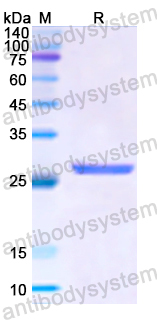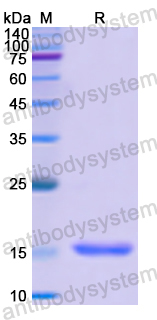Catalog No.
YHG00501
Expression system
E. coli
Species
Homo sapiens (Human)
Protein length
Glu294-Tyr518
Predicted molecular weight
26.67 kDa
Nature
Recombinant
Endotoxin level
Please contact with the lab for this information.
Purity
>90% as determined by SDS-PAGE.
Accession
Q03933
Applications
ELISA, Immunogen, SDS-PAGE, WB, Bioactivity testing in progress
Form
Lyophilized
Storage buffer
Lyophilized from a solution in PBS pH 7.4, 0.02% NLS, 1mM EDTA, 4% Trehalose, 1% Mannitol.
Reconstitution
Reconstitute in sterile water for a stock solution. A copy of datasheet will be provided with the products, please refer to it for details.
Shipping
In general, proteins are provided as lyophilized powder/frozen liquid. They are shipped out with dry ice/blue ice unless customers require otherwise.
Stability and Storage
Use a manual defrost freezer and avoid repeated freeze thaw cycles. Store at 2 to 8°C for frequent use. Store at -20 to -80°C for twelve months from the date of receipt.
Alternative Names
HSTF 2, HSF2, HSF 2, Heat shock transcription factor 2, Heat shock factor protein 2, HSTF2
Heat shock transcription factor 2 reduces mitochondrial pathway apoptosis in intestinal epithelial cells by inhibiting the increase in mitochondrial membrane permeability in ulcerative colitis., PMID:40440295
HDAC1 is involved in the destabilization of the HSF2 protein under nonstress and stress conditions., PMID:40318841
Heat shock factor 2 regulates oncogenic gamma-herpesvirus gene expression by remodeling the chromatin at the ORF50 and BZLF1 promoter., PMID:40245053
Heat shock transcription factor-mediated thermal tolerance and cell size plasticity in marine diatoms., PMID:40210887
Loss of lncRNAs 1700101O22Rik and 1700027A15Rik causes sperm malformation and subfertility., PMID:39950604
Dynamic Chromatin Accessibility and Transcriptional Regulation in the Eyes of Red Tilapia (Oreochromis sp.) in Response to Wintering Stress., PMID:39937323
HSP90 Family Members, Their Regulators and Ischemic Stroke Risk: A Comprehensive Molecular-Genetics and Bioinformatics Analysis., PMID:39736019
The heat shock factor code: Specifying a diversity of transcriptional regulatory programs broadly promoting stress resilience., PMID:39454718
Proteomic profiling identifies a direct interaction between heat shock transcription factor 2 and the focal adhesion adapter talin-1., PMID:39285620
Potential correlation between chronic periodontitis and Parkinson's disease., PMID:39049641
The Expression and Epigenetic Characteristics of the HSF2 Gene in Cattle-Yak and the Correlation with Its Male Sterility., PMID:38791628
LINC01021 Attenuates Expression and Affects Alternative Splicing of a Subset of p53-Regulated Genes., PMID:38730591
Hsf1 and Hsf2 in normal, healthy human tissues: Immunohistochemistry provokes new questions., PMID:38641046
Structural basis for self-discrimination by neoantigen-specific TCRs., PMID:38459027
Comprehensive analysis of human tissues reveals unique expression and localization patterns of HSF1 and HSF2., PMID:38458311
The effect of gonadotropin-inhibitory hormone on steroidogenesis and spermatogenesis by acting through the hypothalamic-pituitary-testis axis in mice., PMID:38285410
Toxicogenomic Effects of Dissolved Saxitoxin on the Early Life Stages of the Longfin Yellowtail (Seriola rivoliana)., PMID:37999421
Genome-wide association study reveals HSF2, GJA1 and TRIM36 as susceptibility genes for preeclampsia: a community-based population study in Tianjin, China., PMID:37735976
Involvement of the heat shock response (HSR) regulatory pathway in cadmium-elicited cerebral damage., PMID:37730984
Meta-Analysis of Heat-Stressed Transcriptomes Using the Public Gene Expression Database from Human and Mouse Samples., PMID:37686255
Heat shock transcription factors demonstrate a distinct mode of interaction with mitotic chromosomes., PMID:37114996
Establishment and validation of exhausted CD8+ T cell feature as a prognostic model of HCC., PMID:37077914
Overexpression of HSF2 binding protein suppresses endoplasmic reticulum stress via regulating subcellular localization of CDC73 in hepatocytes., PMID:36964632
Manganese alleviates heat stress of primary cultured chick embryonic myocardial cells via enhancing manganese superoxide dismutase expression and attenuating heat shock response., PMID:36796895
Hyper-transcription of heat shock factors and heat shock proteins safeguard caprine cardiac cells against heat stress., PMID:36585073
Heat Shock Transcription Factor 2 Is Significantly Involved in Neurodegenerative Diseases, Inflammatory Bowel Disease, Cancer, Male Infertility, and Fetal Alcohol Spectrum Disorder: The Novel Mechanisms of Several Severe Diseases., PMID:36430241
Functional diversification of heat shock factors., PMID:36402935
CBP-HSF2 structural and functional interplay in Rubinstein-Taybi neurodevelopmental disorder., PMID:36385105
Cerebellar injury induced by cadmium via disrupting the heat-shock response., PMID:36301385
HSF4 promotes tumor progression of colorectal cancer by transactivating c-MET., PMID:36229759
HSF2BP protects against acute liver injury by regulating HSF2/HSP70/MAPK signaling in mice., PMID:36167792
Altered sialidase expression in human myeloid cells undergoing apoptosis and differentiation., PMID:35986080
Polymorphisms in the HSF2, LRRC6, MEIG1 and PTIP genes correlate with sperm motility in idiopathic infertility., PMID:35768906
HSFs drive transcription of distinct genes and enhancers during oxidative stress and heat shock., PMID:35687139
DNAJC24 is a potential therapeutic target in hepatocellular carcinoma through affecting ammonia metabolism., PMID:35606363
HSF2 cooperates with HSF1 to drive a transcriptional program critical for the malignant state., PMID:35294249
Heat shock transcription factor HSF2 modulates the autophagy response through the BTG2-SOD2 axis., PMID:35182974
Cell Cycle Regulation by Heat Shock Transcription Factors., PMID:35053319
MF-094, a potent and selective USP30 inhibitor, accelerates diabetic wound healing by inhibiting the NLRP3 inflammasome., PMID:34883112
Identification of Cross-Pathway Connections via Protein-Protein Interactions Linked to Altered States of Metabolic Enzymes in Cervical Cancer., PMID:34790674
The Role of Heat Shock Proteins in Cellular Homeostasis and Cell Survival., PMID:34725587
New genes involved in Angelman syndrome-like: Expanding the genetic spectrum., PMID:34653234
Aqueous extract of Solanum nigrum attenuates Angiotensin-II induced cardiac hypertrophy and improves cardiac function by repressing protein kinase C-ζ to restore HSF2 deSUMOlyation and Mel-18-IGF-IIR signaling suppression., PMID:34634367
Identification of key miRNAs and mRNAs related to coronary artery disease by meta-analysis., PMID:34530741
Interplay between mammalian heat shock factors 1 and 2 in physiology and pathology., PMID:34478606
Structures of heat shock factor trimers bound to DNA., PMID:34458700
Determine genetic variations in heat shock factor gene family (HSFs) and study their effect on the functional and structural characterization of protein in Tali goat., PMID:34370605
Gambogic acid and gambogenic acid induce a thiol-dependent heat shock response and disrupt the interaction between HSP90 and HSF1 or HSF2., PMID:34331200
High expression of LAMA3/AC245041.2 gene pair associated with KRAS mutation and poor survival in pancreatic adenocarcinoma: a comprehensive TCGA analysis., PMID:34134622
The protective effect of nnano-selenium against cadmium-induced cerebellar injury via the heat shock protein pathway in chicken., PMID:34118349



